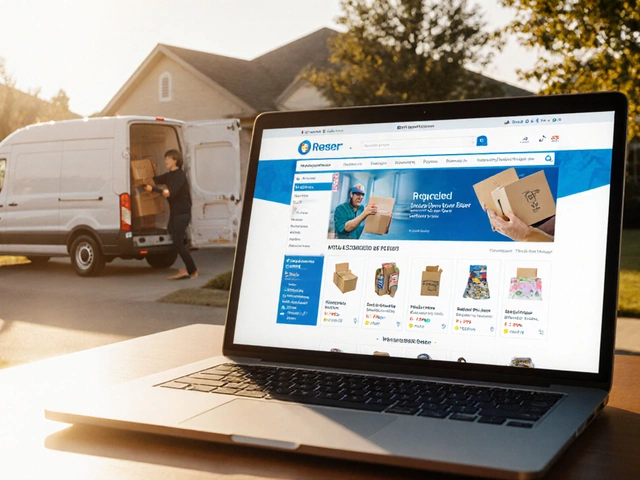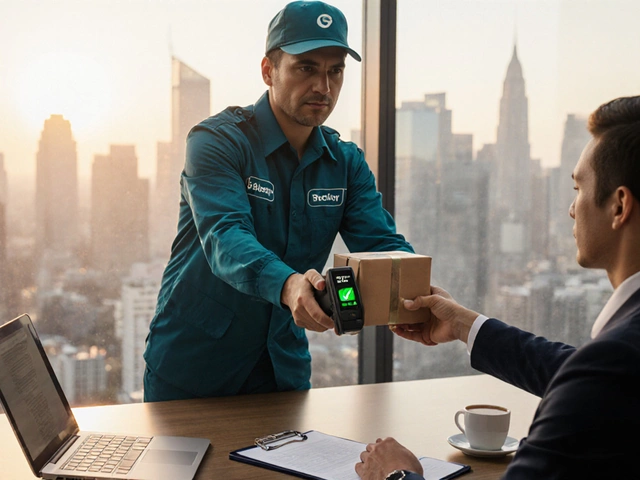Have you ever ordered something online and wondered how it zipped from a warehouse shelf to your doorstep in just a couple of days? That’s logistics in action. But it’s not just huge brands or stores using these services—plenty of others count on logistics companies, even folks you might not expect.
Think small businesses. They need to get products to customers fast, and there’s no room for slow shipping if they want to keep those five-star reviews rolling in. Or picture a person moving across the country. It’s tough to fit a sofa in your car's trunk, but with a logistics provider, your stuff can go from one city to another without you lifting a finger. Logistics isn't one-size-fits-all, and people from all walks of life actually tap into it regularly.
Stick around, because knowing who uses logistics—and how they do it—can seriously help you pick the right service or even streamline your own deliveries. Maybe you’ll see yourself in one of the stories and learn a shortcut or two for your next big shipment.
- Why Everyone Needs Logistics Help
- Ecommerce Stores and Logistics Support
- Manufacturers Leaning on Delivery Experts
- Unexpected Users: Events and Individuals
- What to Know Before Choosing a Logistical Partner
- Easy Tips to Maximize Your Logistics Experience
Why Everyone Needs Logistics Help
You might think logistics is just about moving giant shipping containers across oceans, but it's a crucial part of everyday life for businesses and regular people. Any time you order a pizza, shop for clothes online, or send a surprise gift to your cousin, logistics companies are working behind the scenes to make sure things get from point A to point B.
There's a good reason the global logistics market hit around $10.6 trillion in 2024 (Statista). That covers everything from international shipping giants, to local couriers dropping off last-minute birthday presents. Even tech companies, schools, and hospitals depend on timely deliveries of equipment, supplies, and documents to keep operations running smoothly. Without reliable logistics, shelves would be empty, businesses would stall, and daily routines would freeze.
- Logistics companies help ecommerce shops handle huge spikes in online orders, like during holiday sales.
- Hospitals count on logistics for fast shipment of life-saving meds and equipment.
- Restaurants, grocery stores, and even local farmers use logistics to keep shelves stocked with fresh food.
- Large events (think music festivals) rely on logistics to transport stage gear and supplies quickly and safely.
Here's a snapshot to show who uses logistics most often:
| User Type | Common Logistic Needs |
|---|---|
| Online retailers | Warehousing, shipping, returns |
| Healthcare providers | Medical supply delivery, temperature control for medicine |
| Restaurants & Grocers | Fresh food sourcing, regular resupply |
| Individuals | Moving households, sending gifts |
| Event organizers | Stage setup equipment, merchandising |
Bottom line: logistics isn’t just for big companies. Almost everyone touches it, whether they're aware or not. It underpins how we shop, eat, celebrate, and even get medical care.
Ecommerce Stores and Logistics Support
If you love shopping online, you’re not alone—globally, ecommerce sales shot past $5 trillion in 2023 and are still growing fast. But all that clicking and buying only works because ecommerce stores work closely with logistics companies that move everything from phone cases to kitchen gadgets right to your door.
What do these logistics companies actually do for online sellers? Here’s the deal:
- Shipping Orders: Once you hit “purchase,” the logistics company picks, packs, and ships the item. Big players like Amazon even do same-day or next-day delivery thanks to slick logistics partnerships.
- Tracking Deliveries: Real-time tracking isn’t magic—it’s all possible because stores work with advanced delivery networks that update locations constantly.
- Returns Management: Ever returned shoes that didn’t fit? Logistics companies handle that, too, making the whole process smoother for everyone.
- International Shipping: Many ecommerce shops now sell worldwide. Logistics pros take care of customs, paperwork, and make sure orders meet local rules.
Here’s a quick glance at why so many stores turn to logistics partners:
| Benefit | How It Helps Ecommerce |
|---|---|
| Warehouse Locations | Stores products closer to customers for quicker delivery |
| Automated Systems | Saves time by picking, packing, and tracking without errors |
| Cost Savings | Bulk shipping rates mean lower shipping costs for both store and shopper |
| Scale Up Fast | Can handle big seasonal sales like Black Friday without major delays |
One tip: If you’re running an ecommerce business, compare a few logistics providers before you sign anything. Look for those with tracking, flexible delivery options, and good customer service. That way you’re ready for customer demands—even those last-minute midnight shoppers.
Manufacturers Leaning on Delivery Experts
Manufacturers are some of the biggest customers for logistics companies. Picture a car factory in Detroit waiting on parts from Asia or a small electronics brand needing to move products from its plant to stores across Europe—timing and efficiency are everything. If there's a hiccup in the delivery, production can grind to a halt. It's not just about trucks and warehouses; it's a real balancing act that can make or break a company's profits.
One key reason manufacturers turn to logistics companies is to manage what's called 'just-in-time' delivery. This means materials show up right when they're needed, not too early and definitely not too late. That way, businesses avoid paying extra for unnecessary storage and keep operations running on a tight schedule.
Here’s a look at why logistics is a game changer for manufacturers:
- Speed: Fast delivery reduces downtime and keeps production lines moving.
- Reliability: Trusted logistics partners offer real-time tracking. No more guessing where that urgent shipment is.
- Cost Savings: Grouping shipments and smarter delivery routes can slash expenses.
- Global Reach: Moving stuff across borders? Logistics companies sort out customs and paperwork, so goods aren’t stuck in limbo.
A 2024 report from Statista showed that over 65% of global manufacturers rely on third-party logistics providers for at least part of their supply chain—up from 53% just five years ago. That’s a huge jump, which shows just how much the industry is changing.
| Year | Percent Using Logistics Companies |
|---|---|
| 2019 | 53% |
| 2022 | 61% |
| 2024 | 65% |
On top of that, logistics pros often have industry knowledge—like how to safely transport fragile goods or keep machinery from being damaged on bumpy roads. Some even handle reverse logistics, which means getting faulty or recalled items from customers back to the manufacturer without hassle.
If you’re a manufacturer, teaming up with a solid logistics company means you can focus less on the headache of shipping and more on building cool stuff. It’s about making sure everything lands where it should, exactly when it’s needed.

Unexpected Users: Events and Individuals
If you think logistics companies only deal with mass shipments and pallets, think again. There's a whole world of unexpected users out there. For example, event organizers rely on logistics pros more than most people realize. Behind the scenes of concerts, marathons, or even big weddings, you'll find organizers coordinating with logistics teams to make sure sound equipment, staging, banners, and food supplies get to the right place, right on time. Big events in cities like New York or Austin routinely work with specialized logistics services for their complicated delivery needs—sometimes even moving gear between venues in the same day.
Individuals use logistics more than you’d expect, too. Relocating for a job? People hire logistics companies to move their furniture and fragile belongings cross-country, or even overseas. Students moving in and out of college dorms use mini-logistics services that specialize in single-room moves. Even large group vacations, like destination family reunions or adventure travel groups, often depend on logistics providers to ship bulky equipment—think surfboards or bikes—to far-flung destinations so nobody has to wrestle them through airport check-in.
There are also cases where logistics services step in during emergencies. After a house renovation gone wrong, people call on logistics firms to safely haul away debris or deliver new appliances at short notice. And don’t forget art lovers: galleries and private collectors often use climate-controlled logistics solutions to move valuable art pieces securely from one show or home to another.
So, it’s not just corporations. If you host an event, move house, or need to ship something odd-sized or precious, you’re part of the growing community relying on logistics companies for peace of mind and practical help.
What to Know Before Choosing a Logistical Partner
Picking a logistics company isn’t just about grabbing the first name that pops up on Google. There’s a lot riding on your choice, especially if you’re running a business or moving something valuable. The real question is, how do you figure out who’s up for the job and won’t let you down?
First, check their track record. Most businesses rely on logistics companies that can actually deliver on time and keep packages safe. In 2024, a report from Statista showed that 63% of consumers said late or mishandled deliveries made them swear off a retailer completely. That tells you how important reliability really is.
- Logistics companies should offer tracking, real-time updates, and decent insurance options. Transparency matters, especially if your shipment is valuable or time-sensitive.
- Ask about their network. Do they cover your pickup and drop-off points without passing you between a bunch of subcontractors? The more direct their network, the less likely things go missing.
- Find out if they handle problems well. Delays, weather issues, or customs hang-ups happen. A good partner keeps you in the loop and helps fix issues instead of leaving you hanging.
- Cost matters, but dirt-cheap usually means cut corners. Balance price with actual service quality.
- Check their speciality. Some companies excel at big freight, while others do best with online sales or personal moves. Pick based on what you ship, not just the logo.
Here’s a quick table with some key questions to ask before signing anything:
| What To Ask | Why It Matters |
|---|---|
| Do you provide tracking and insurance? | Peace of mind and problem-solving if things go wrong. |
| How do you handle delays or lost items? | Shows if they’re responsive, not just when things go right. |
| Can I see customer reviews or testimonials? | Real feedback helps spot red flags early. |
| What’s your specialty? | Some shine at fast small deliveries, others at crates across continents. |
| What’s included in the price? | No one likes surprise fees at the finish line. |
Don’t forget to look up their safety records, especially if you're shipping fragile, regulated, or high-value goods. In the end, the more you know upfront, the fewer surprises you’ll get later.
Easy Tips to Maximize Your Logistics Experience
If you want to get the most out of working with a logistics company, a few smart moves can make all the difference. Whether you’re shipping a big batch of products or mailing a single package, small changes make everything smoother and less stressful.
- Double-check your shipping info: Most delays come from tiny errors in addresses or contact details. Always make sure names, phone numbers, and house numbers are up to date. Typos can send even the best shipments on a wild detour.
- Know your options: Ask about different services before you commit. Sometimes express shipping is only a bit more expensive but a lot faster. If saving a day matters, it’s worth exploring all the options a provider offers.
- Pack smart: Use sturdy boxes and don’t skimp on tape and bubble wrap. A study by UPS found that nearly a third of breakages happen because of bad packaging, not rough handling. If you’re not sure how to pack something, most logistics companies have packing guides or even offer the service in-house.
- Track everything: Make the most of tracking links and apps. Not only does it chill your nerves, but it also helps solve problems early if a delivery goes sideways. Set notification alerts so you catch delays as soon as they happen.
- Stay in touch: If your shipment is important, don’t be shy about following up with customer service. Good companies don’t mind questions—sometimes they even spot issues before you do if you keep the lines open.
- Read reviews first: Don’t just go with the first name you see online. Check recent reviews on independent sites, especially if you’re shipping valuables or using a company for the first time. Look for consistent praise—or red flags—about their reliability and care.
The more you know and prepare, the smoother your logistics experience gets. It’s just a matter of planning ahead, paying attention to details, and using the tools companies offer. Remember, it’s your stuff or your sale on the line, so a little effort goes a long way.





